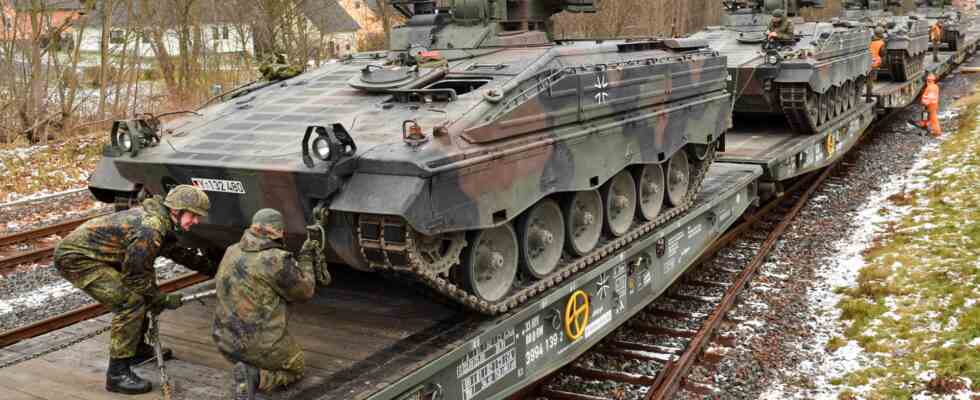analysis
Status: 03.05.2022 02:15 a.m
What would be the consequences under international law if Germany were to train Ukrainian soldiers in weapon systems? This has not been clearly clarified, there are hardly any comparable precedents. The consequences would probably be more political.
The political discussion about the type and scope of possible arms deliveries to Ukraine is in full swing. On a (still) hypothetical level, another question is now being raised: What legal consequences would there be if Germany not only sent weapon systems to Ukraine, but also trained Ukrainian soldiers on these weapons?
A report by the Bundestag’s scientific service discusses whether Germany would then become a war party.
Ukraine is allowed to defend itself against Russia
First of all, it should be noted that international law experts are in agreement on this point: Russia’s war of aggression against Ukraine is a clear violation of the UN Charter’s prohibition on the use of force. The General Assembly of the United Nations has also recognized Russia’s aggression noted, expressly disapproved and urged Russia to withdraw its troops. From this it can be deduced: Ukraine has a right to self-defense in the current situation.
According to the United Nations Charter, this can be exercised “individually or collectively”. Ukraine has specifically requested assistance. In terms of international law, this means that support for Ukraine by other states is fully covered by international law. This includes not only arms deliveries, but theoretically even the sending of combat troops. All uninvolved states have so far ruled this out – but it would be permissible under international law. The question, when a state itself becoming a party to the conflict or a war party has not yet been clarified. However, one thing is clear: Being a party to the war does not mean acting in violation of international law.
Weapons deliveries are not legally an “interest”
Many countries, including Germany, are already supplying arms to Ukraine. Here, too, there is a unanimous consensus among international law experts: that does not make a state involved in a war. It has not been finally clarified whether the accompanying briefing of Ukrainian soldiers will change anything. The Economic Service of the Bundestag says in its report: “Only if, in addition to the supply of weapons, the instruction of the conflict party or training in such weapons were also an issue would one leave the secured area of non-warfare.”
As evidence, the report cites an interview in the Neue Zürcher Zeitung (NZZ) with Bochum-based international law expert Pierre Thielbörger on March 13: “The delivery of arms is not in itself an act of war,” Thielbörger says there. “There is no state practice that accepts that. It could be different if there is advice on how to use weapons. But here, too, the consideration of the individual case remains decisive.”
Weapons training not necessarily “participation in the war”
Other international law experts are committed: Even the training of other soldiers in weapon systems does not turn an uninvolved state into an involved one. The cases in which Germany actually takes on this role are very narrowly defined. “In my opinion, there are only two possible scenarios in which Germany could become a party to the war,” says Philipp Dürr from the Institute for Public Law and International Law at the University of Bonn. “First: Russia is attacking us directly, or second: Germany is sending Bundeswehr soldiers to active combat missions in Ukraine.”
The first scenario cannot be controlled anyway, since it depends solely on Putin – who also attacked Ukraine without the latter providing an objective reason. The second scenario is unlikely because it is ruled out by all Western heads of government. Under international law, it would mean “German soldiers on combat missions in Ukraine and German Navy ships on the high seas could be attacked,” Dürr said. “Any military strikes on German territory would continue to be classified as a war of aggression and would have to be viewed as a violation of the international prohibition on the use of force.”
In this case, Germany would then have the right to self-defense, as is currently the case in Ukraine. In addition, this would then also trigger the alliance case according to the NATO treaty. The other states of the defense alliance would then be obliged to provide assistance.
Precedents are rare
Solid judgments on the question of how weapons training by “external states” is to be assessed under international law are rare. In 1986, the International Court of Justice (ICJ) in The Hague ruled that the USA violated international law’s ban on intervention by supporting the “Contras” rebel group in Nicaragua – and also providing them with military training.
However, the case can hardly be compared with the current war in Ukraine, since it was about an internal conflict. At that time, the USA did not react to an armed war of aggression in which a sovereign state asked for help. As proof of “entering the war” through weapons training, the ICJ judgment can only be used to a very limited extent.
From a purely international law point of view, the debate about training Ukrainian fighters in weapon systems is therefore not particularly contentious. It is independent of how such a step is politically evaluated. Here the views differ widely.
Can training Ukrainian soldiers mean entering the war?
Eva Huber, ARD Berlin, May 2, 2022 at 4:22 p.m

